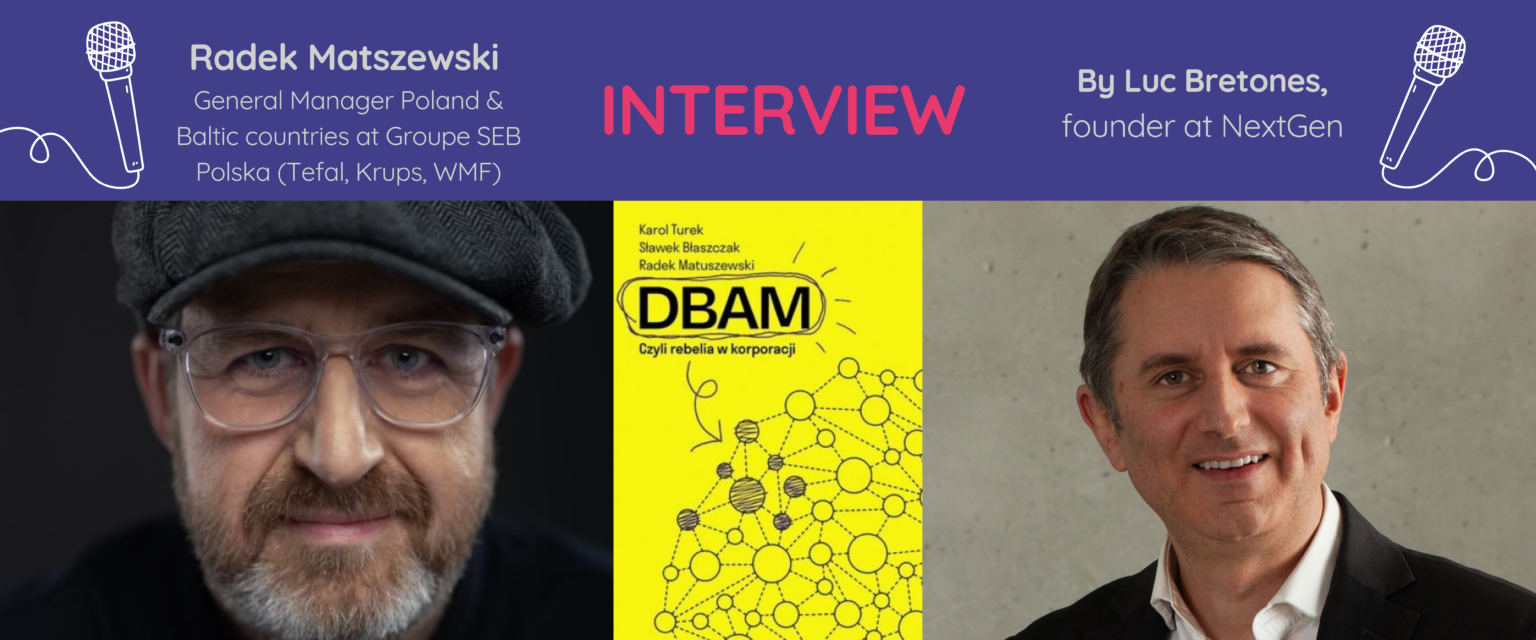
"We created our own, local DBAM culture (DBAM means in Polish I Care) which is built on 3 pillars which are AUTONOMY, RESPONSIBILITY & TRUST"
Radek Matszewski
I was working in a company which was totally not fitting to my values, working culture, ambitions, and weak management. The problem was in the local team, the frustration was coming from cooperation with the head office which, shortly speaking, was defending the status quo not understanding that to improve results we had to do the change. Finally after one year I decided to find a new place, to do the change, because simply speaking I was unhappy. I started to look for a new job and via the normal recruitment process, I got the job in Groupe SEB Poland.
I don’t know what you mean by shared governance. I would rather say that we realized that the actual classical model of management of the company had no potential to improve performance. We had good results, but we felt that we had limits coming from growing complexity of the business, need to make fast decisions, and need to have high professional skills. I would say that following Henry Ford, we needed to create a “car not faster horse”. Additional impulse was results of Great Place to Work survey results which were showing that 55% of our employees were treating GSEB Poland as a Great Place to Work vs the best companies that time in Poland above 80%. So finally having internal feelings & feedback from the teams we were sure that we had to do change. The only & more important question was what kind of change. After some months of talks, inspirations, discussion we decided that the game changer would be the new way of working, the new working culture.
We were working on defining our local working culture for a few months looking for the inspirations everywhere including our company global values. Finally we created our own, local DBAM culture (DBAM means in Polish I Care) which is built on 3 pillars which are AUTONOMY, RESPONSIBILITY & TRUST. Shortly speaking the company is split by bigger & smaller “areas” and every piece has dedicated people who care about the area having autonomy & responsibility for the area. What is important is that the person is empowered to make decisions in the area. We are calling the system “distributed autocracy”. DBAM culture is not about hierarchical structure. We are working in servant leadership mode which somehow is opposite, because it means that leaders are for teams not teams are for managers. We are not working in functional silos, but we are working in multifunctional projects teams/streams. Shortly speaking we can describe it as a “autonomous teams, teams of leaders supported by experts & caregivers”. DBAM culture is based on a few fundamentals which are “push authority down to information” , “96% of problems are hidden for top management” & “all decisions should be made as low as possible in the organizations, as close as possible to the place where problem/opportunity exist”.
There was no initial success, I would say that we had initial failure. I have in mind that to change the culture you have to be patient. We thought in the beginning that “we say, we announce and everything will happen” … wrong. The initial challenge is to build, rebuild trust in the teams. Example, if I had a very micromanager style, giving them now freedom, no space, how from day one can they trust you into the new approach ? So the key success factor & challenge was to change ourselves (management team now called leadership team), to be the change which others should see, be the role model. I would say that the first year of implementation was not the change of the company culture, but the change of eleven people leading the company in that time. Hard work, painful, because you have to change yourself in the beginning. Talking about protecting the experiment the key element is to deliver results, Delivering results you are protecting experiment, finally you are proving that it is working.
As I said in the first year it was the change of the Leadership team which was the key milestone of the total change. Then we all saw the change and we could spread the new culture to the whole organization. Today the whole Polish team is working in DBAM culture. I would say that process took around 3 years and COVID was finally consolidated the DBAM culture fundamentals. Actually the key challenge is to properly teach & onboard new comers who in majority are coming from traditional, hierarchical working cultures. Sometimes it takes time, because people … don’t believe 😊.
Yes, we are inspired by a lot of ideas. The key books: “Reinventing organizations” by Frederic Laloux, “Let my people surf” by Yves Chouinard, “Delivering happiness” by Tony Hsieh, “Anti-Complex” by Stephan Rend , “Legendary service” by Ken Blanchard, Turn around the ship” by David Marquet, “Team of Teams” by Stanley McChristal. Agile manifesto, scrum, Holacracy also were our inspirations. Finally we created a kind of local, own patchwork where a little bit of everything which we thought is fitting to us which is DBAM culture. We are constantly trying to improve, to adapt to all changes around our culture to keep it as modern as possible, as progressive as possible, as food for performance as possible, and as good for people as possible. We do not have special rituals. I would say that we do have some focus areas which are internal communication including transparency, anti-complexity, openness built on psychological safety, diversity including diversity of thinking/ideas, education, some small rules we do have regarding meetings, mailing & way to analyze performance.
No, we do not have special toolkits. The only tools which we are using are a) “who is who ?” describing individual roles, b) project team manifesto describing the purpose, KPI’s, key projects & key action of the teams.
My experience tells me that the business performance depends more & more on people, but company culture depends on leaders, I would say even on the team leaders. Culture is a top down exercise depending very much so the leader is the key success factor. I do also believe that the working culture is underestimated, the power of people’s engagement, happiness are very often not treated seriously as a key & the most important business performance driver. I do believe that until the company, organization is delivering results & people are happy nobody will touch the culture. Finally everywhere the results are base for freedom. The change of organization leader is a sensitive moment which is the moment when company culture can fail. The very interesting question is what would be the people’s reaction if somebody would like to change people oriented culture delivering results for old fashion, hierarchical models ? I do believe that if the company is well established, solid, the reverse change wouldn’t be possible.

An interview by Luc Bretones, Founder at NextGen
| Cookie | Duration | Description |
|---|---|---|
| cookielawinfo-checkbox-analytics | 11 months | This cookie is set by GDPR Cookie Consent plugin. The cookie is used to store the user consent for the cookies in the category "Analytics". |
| cookielawinfo-checkbox-functional | 11 months | The cookie is set by GDPR cookie consent to record the user consent for the cookies in the category "Functional". |
| cookielawinfo-checkbox-necessary | 11 months | This cookie is set by GDPR Cookie Consent plugin. The cookies is used to store the user consent for the cookies in the category "Necessary". |
| cookielawinfo-checkbox-others | 11 months | This cookie is set by GDPR Cookie Consent plugin. The cookie is used to store the user consent for the cookies in the category "Other. |
| cookielawinfo-checkbox-performance | 11 months | This cookie is set by GDPR Cookie Consent plugin. The cookie is used to store the user consent for the cookies in the category "Performance". |
| viewed_cookie_policy | 11 months | The cookie is set by the GDPR Cookie Consent plugin and is used to store whether or not user has consented to the use of cookies. It does not store any personal data. |